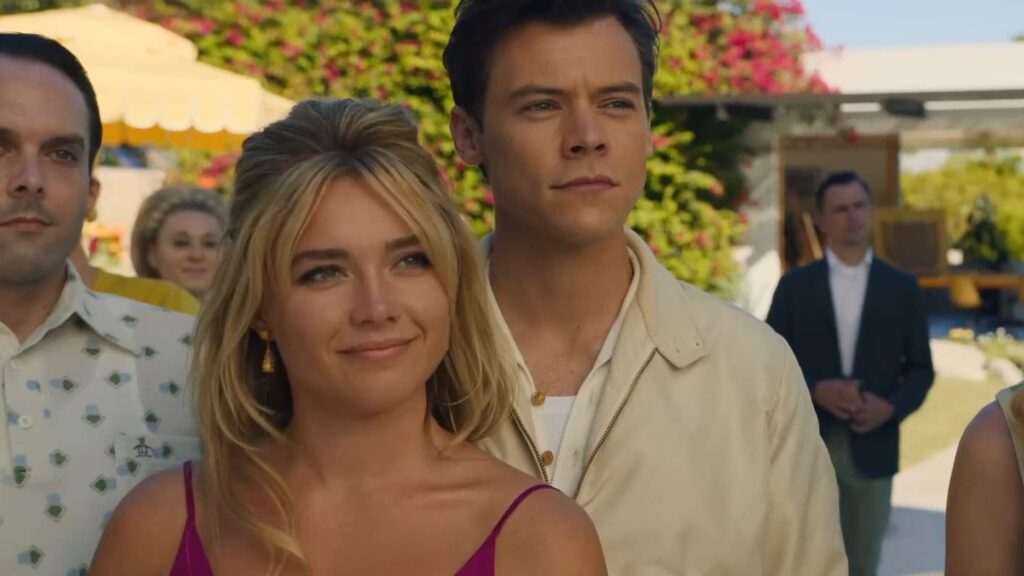
As the glamorous host of the glamorous party saunters down from his lofty perch on the glamorous balcony to grace the awestruck guests with his glamorous presence, he asks a rhetorical question: “What is the enemy of progress?” A member of the audience immediately replies, with Pavlovian instinct, “Chaos.” This may be accurate in certain industries—our host nods in approval—but when it comes to movies, it’s rarely the case. The true enemy of artistic progress is order, or at least pernicious forms of it—safety, predictability, complacency. Chaos, by contrast, is often the harbinger of innovation. It’s difficult to produce great art without first making a mess.
And Don’t Worry Darling, the second film directed by Olivia Wilde (from a script by Katie Silberman), is undoubtedly a mess. Its tone is overheated, its themes are muddled, and its plotting is ridiculous. But it nonetheless exhibits a brazen level of ambition—a visual and narrative boldness which vacillates between audacity and inanity—that’s commendable despite its gaps in logic. It may be chaotic, but at least it’s memorable.
It’s also something of a surprise coming from Wilde, at least based on her debut feature, the finely observed coming-of-age story Booksmart. Where that movie was focused, intimate, and familiar, Don’t Worry Darling is scattered, expansive, and strange. It also provides Wilde with a larger canvas to hone her obvious talent for composing striking images. An early nighttime sequence in which the effervescent Alice (a typically wonderful Florence Pugh) goes joyriding in the desert with her husband, Jack (Harry Styles), glows with foggy beauty, their sleek car’s headlights piercing through exhaust fumes like beacons of happiness.
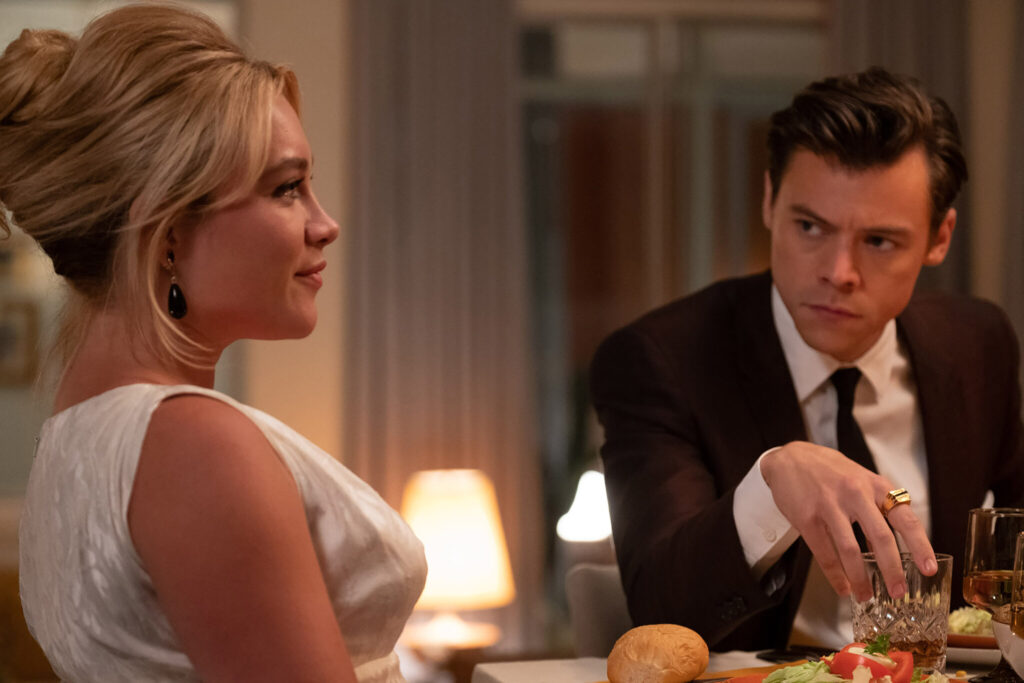
Alice has ample reason to be pleased. Jack has secured lucrative employment with the Victory Project, an indeterminate but vaguely militaristic venture whose secretive work occasionally sends earthquake-like ripples through their cozy California suburb. Every morning, he and other handsome, satisfied-looking men kiss their gorgeous wives goodbye, hop into their pastel-colored sedans, and drive off into the salt flats while their spouses shop, cook, and sip liquor in lounge chairs. (The time period is unspecified, but judging from the cars, the exquisite production design, and the gender norms, we’re in the 1950s.) Wilde stages these early scenes with halcyon warmth, creating a vibe that’s less pure Pleasantville than sexed-up Sirk; the moment when Jack returns home and instantly goes down on Alice, causing her to sweep savory-looking dishes off the dining room table as she surrenders to the throes of pleasure (the camera cheekily looks down from above), is a burst of ostensible feminist fantasy. Our heroine’s name is no accident; she’s living in Housewife Wonderland.
Yet as Don’t Worry Darling progresses, peculiar happenings begin to puncture Alice’s cocoon of domestic bliss. A batch of eggs she bought is inexplicably hollow. A biplane crashes into the distant sands, yet a rigid trolley driver refuses to deviate from his route to investigate. Victory’s charismatic founder, Frank (a wily Chris Pine), shoots her curious, appraising looks. And while her joie de vivre is shared by most of her neighbors—including Bunny, played by Wilde herself in a role that allows her to draw on her natural allure, which she accentuates with a golden-yellow blouse and matching hoop earrings—her friend Margaret (KiKi Layne) grows sullen, whispering about dark deeds and disappearances.
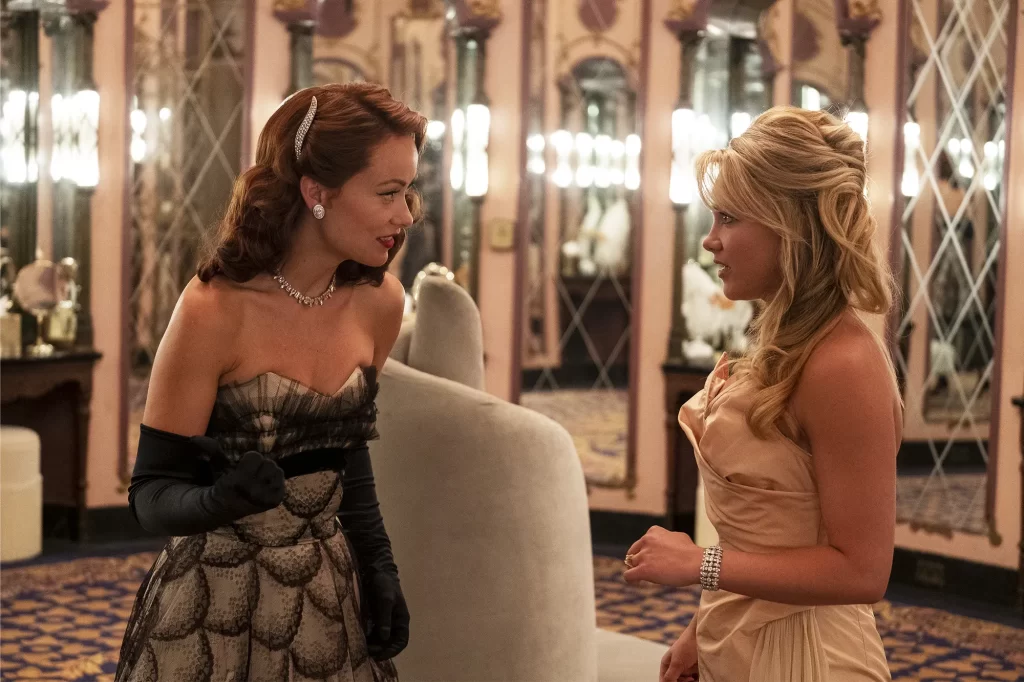
As Alice begins to probe at potential flaws in her paradise, Wilde seeks to amplify her niggling discontent with theatrical flourishes. Some of these, such as jagged editing rhythms where she splices seemingly random shots into various scenes, are less productively disorienting than merely irritating. But others are genuinely spooky. At a ballet class (conducted by Frank’s wife, Shelley, portrayed by an appropriately imperious Gemma Chan), Alice looks in the mirror and sees her reflection impossibly replaced by the specter of a grim and bleeding Margaret; around the same time, she imagines the walls of her house literally closing in on her. Is she losing her mind? Or is something more nefarious going on?
For its opening hour, Don’t Worry Darling is eye-catching and engaging, even if Wilde is more interested in embellishing the details of her oddly ornamented world than in fleshing out her characters. When it comes to coloring her universe with emotion, she mostly relies on her cast, which is why Pugh’s presence is so crucial. The actor has a gift for imbuing outlandish scenarios with credible humanity—recall that she essentially transformed Midsommar from a smoothly made freak-out into an agonizing crucible of deliverance—and here she lends real weight to Alice’s suffering, preventing her from becoming a disposable cog within a perverse machine. (Reports of on-set clashes between Wilde and Pugh aren’t evident in the finished product, and you will forgive me if I ignore the film’s irrelevant, faintly disastrous press tour.) For his part, Styles doesn’t so much hold his own as recognize his own inferiority; aside from a minor meltdown in a car (good) and a bizarre celebratory dance sequence (bad), he keeps things in low gear, and his pleasant blandness suits the part’s functionality. (Rather than forcing Styles to adopt an American accent, Wilde wisely bakes Jack’s Britishness into the plot; she need not worry in regard to Pugh, whose stateside vocals are characteristically flawless.)
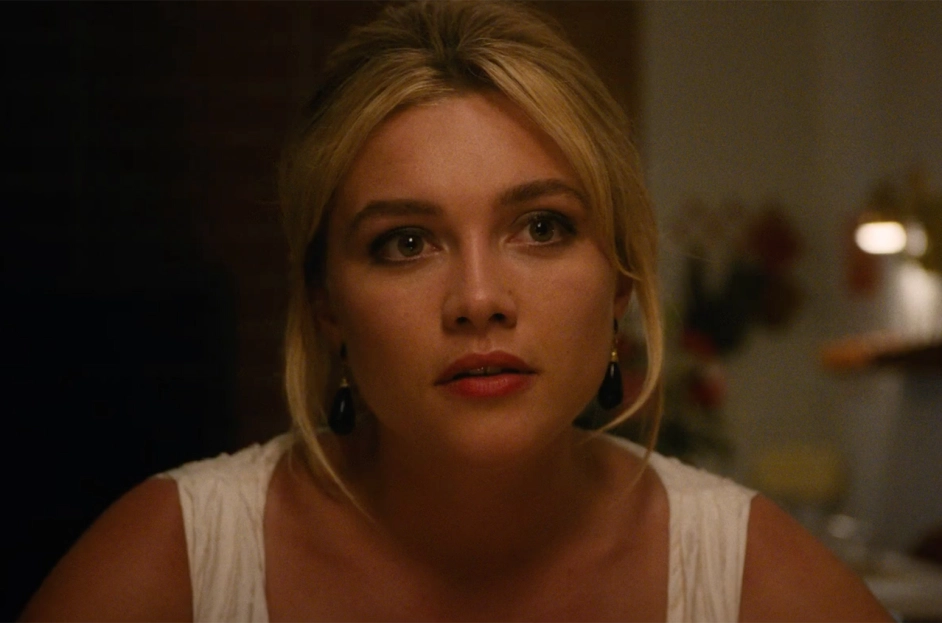
Pugh’s magnetic vulnerability—her skill for making the unbelievable believable—sustains Don’t Worry Darling’s foreboding sense of menace… for a time, at least. A soft-spoken confrontation at a dinner party between Alice and Frank, whose natural charm Pine spikes with a wolfish impudence, hints at the possibility of burgeoning excitement and conflict, suggesting that the movie’s mysteries will both deepen and sharpen before finally resolving with dramatic clarity and moral force.
That, to put it mildly, does not happen. Instead, the more Don’t Worry Darling reveals about its world, the less sense it makes, and the more ludicrous it grows. Certain images still pop—the shot of hostile security personnel clad in red jumpsuits clambering up a mountainside is particularly vivid—but they are deployed in service of a narrative that is as incoherent as it is implausible.
Some may deem this absurdity to be intentional—the natural byproduct of a picture that traffics in existential confusion and dream logic. But the preposterousness on display here strikes me more simply as a consequence of loose and sloppy screenwriting. This isn’t a matter of churlishly picking nits or locating plot holes. The real problem is that the movie’s relentless twistiness is wholly disconnected from its characters; the irrationality is fatal not because it’s bewildering, but because it’s untethered from explicable human behavior. Rather than functioning as flesh-and-blood people or even allegorical expressions, the figures on screen become pieces in an ill-fitting jigsaw puzzle.
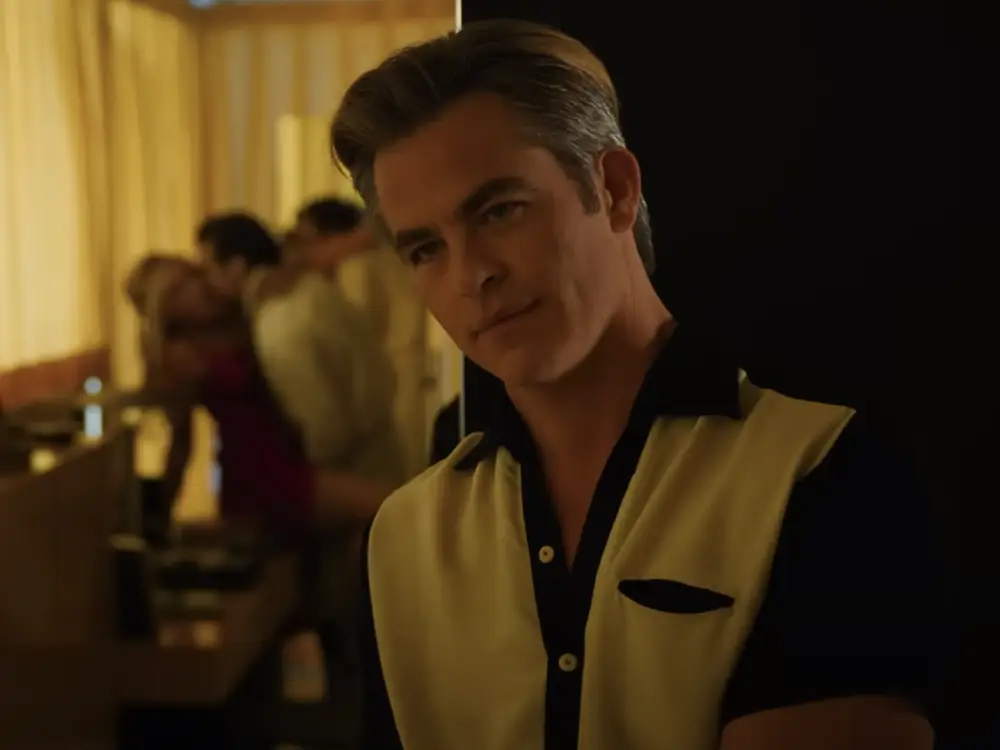
Which is hardly unprecedented. It isn’t quite fair to label Don’t Worry Darling a pastiche, even if Wilde wears her numerous influences broadly. (They include The Stepford Wives, David Lynch, middle-period M. Night Shyamalan, and a certain classic from the late ’90s whose mere title arguably qualifies as a spoiler.) She isn’t the first filmmaker to sacrifice personal realism at the altar of dubious shocks. But given the streamlined fluidity of Booksmart, it’s disappointing that her follow-up expends so much energy contorting itself into a pretzel, and in the process exposes its emotional fabric as threadbare.
And yet, Don’t Worry Darling is too damn interesting—too promising, too good-looking, too messy, too weird—to be dismissed. It’s ultimately a failure, but its process of failing is undeniably watchable, and it smacks of originality even as it collapses into tedium. When it comes to forecasting Wilde’s future, the title of this fascinating, frustrating movie proves true and false at once. It’s cause to worry, and also reason to hope.
Grade: B-
Jeremy Beck is the editor-in-chief of MovieManifesto. He watches more movies and television than he probably should.
